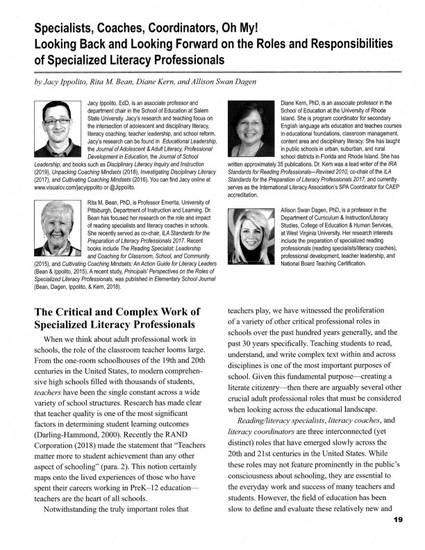
Article
Specialists Coaches Coordinators Oh My Looking Back And Looking Forward On The Roles And Responsibilities Of Specialized Literacy Professionals
Massachusetts Reading Association Primer
(2019)
Abstract
When we think about adult professional work in schools, the role of the classroom teacher looms large. From the one-room schoolhouses of the 19th and 20th centuries in the United States, to modern comprehensive high schools filled with thousands of students, teachers have been the single constant across a wide variety of school structures. Research has made clear that teacher quality is one of the most significant factors in determining student learning outcomes (Darling-Hammond, 2000). Recently the RAND Corporation (2018) made the statement that "Teachers matter more to student achievement than any other aspect of schooling" (para. 2). This notion certainly maps onto the lived experiences of those who have spent their careers working in PreK-12 education—teachers are the heart of all schools.
Notwithstanding the truly important roles that teachers play, we have witnessed the proliferation of a variety of other critical professional roles in schools over the past hundred years generally, and the past 30 years specifically. Teaching students to read, understand, and write complex text within and across disciplines is one of the most important purposes of school. Given this fundamental purpose—creating a literate citizenry—then there are arguably several other crucial adult professional roles that must be considered when looking across the educational landscape.
Disciplines
Publication Date
2019
Citation Information
Jacy Ippolito. "Specialists Coaches Coordinators Oh My Looking Back And Looking Forward On The Roles And Responsibilities Of Specialized Literacy Professionals" Massachusetts Reading Association Primer Vol. 47 Iss. 2 (2019) p. 19 - 28 Available at: http://works.bepress.com/jacy-ippolito/56/
